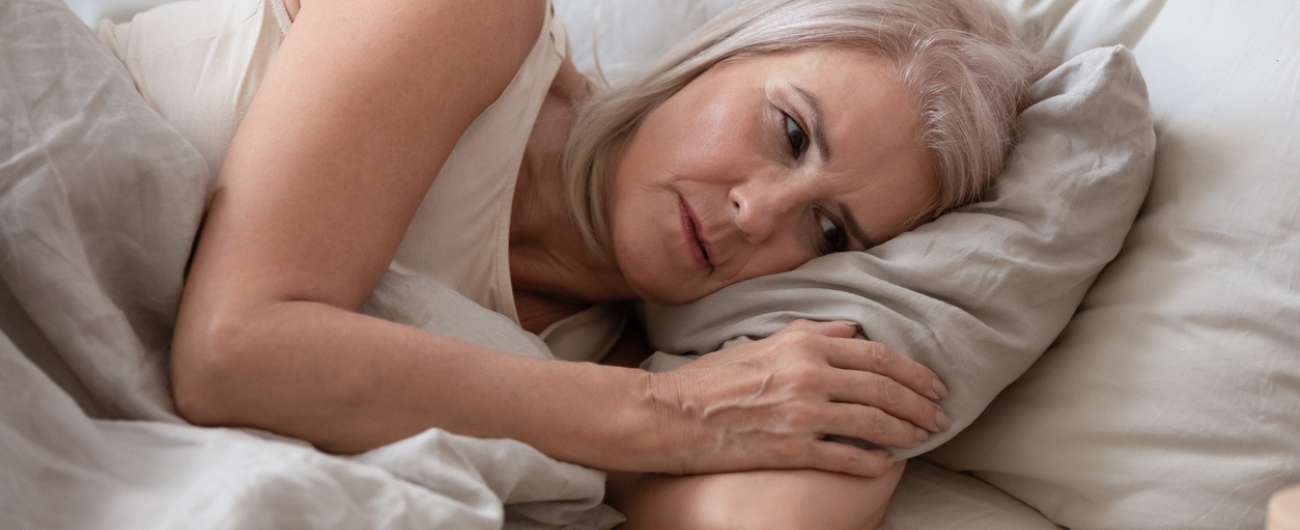Sleep is a crucial element of overall wellbeing, yet many women grapple with insomnia at some point in their lives. Cognitive Behavioural Therapy for Insomnia (CBT-I) offers a beacon of hope for those seeking a non-pharmacological approach to reclaiming restful nights. Let's delve into what CBT-I entails, its effectiveness, its relevance during menopause, natural sleep aids, and the significance of sleep hygiene in the pursuit of better sleep.
Understanding CBT-I
CBT-I is a structured program designed to address the mental and behavioural factors contributing to insomnia. It doesn’t involve medication but rather focuses on changing thoughts and behaviours related to sleep. The therapy comprises several components:
Cognitive Restructuring
This involves identifying and challenging negative thoughts and beliefs about sleep. Women often face stressors unique to their lives, such as caregiving responsibilities or work-related pressures, which can impact their sleep patterns. CBT-I helps reframe these stressors to minimise their influence on sleep.
Sleep Restriction
This technique involves limiting the time spent in bed to match the actual time spent asleep. By creating a more consolidated sleep pattern, the body learns to associate the bed with sleep rather than wakefulness.
Stimulus Control
It involves associating the bed and bedroom environment exclusively with sleep and intimacy. This includes maintaining a consistent sleep schedule and avoiding stimulating activities in bed (other than sex).
Relaxation Techniques
Learning relaxation methods, such as deep breathing exercises or progressive muscle relaxation, can help women unwind and prepare for sleep.

What can impact Insomnia?
To understand Insomnia, it is crucial to understand what contributes to the growing number of people counting sheep each night in their relentless pursuit for sound sleep. Are we too busy? Are we too stressed? Lifestyle factors are just some of the issues that need to be addressed as well as;
Stress and Anxiety: Persistent stress and anxiety can disrupt sleep patterns, making it challenging to fall asleep or stay asleep throughout the night.
Poor Sleep Hygiene: Irregular sleep schedules, excessive screen time before bed, and an uncomfortable sleep environment can hinder quality sleep.
Medical Conditions: Chronic pain, sleep apnoea, restless legs syndrome, and other medical conditions can significantly impact sleep quality.
Hormonal Changes: Women often experience sleep disturbances during hormonal fluctuations, such as menstruation, pregnancy, and menopause.
Lifestyle Factors: Excessive caffeine or alcohol intake, lack of physical activity, and poor diet can negatively affect sleep.
Environmental Factors: Noisy or disruptive environments, uncomfortable temperatures, or excessive light can interfere with falling or staying asleep.
Psychological Factors: Depression, PTSD, and other mental health conditions can contribute to sleep difficulties.
Medications: Certain medications, especially those that affect the central nervous system or have stimulating effects, can disrupt sleep patterns.
Shift Work or Jet Lag: Irregular work schedules or frequent time zone changes can disturb the body's natural sleep-wake cycle.
Addressing these factors alongside implementing CBT-I techniques, maintaining good sleep hygiene, and considering natural supplements can significantly improve sleep quality for women dealing with insomnia.
Effectiveness of CBT-I
Research consistently demonstrates the effectiveness of CBT-I in treating insomnia. Studies have shown that it not only improves sleep quality but also has long-lasting effects, making it a valuable tool for women seeking a sustainable solution to their sleep problems. Unlike medication, which may have side effects and potential dependency issues, CBT-I addresses the root causes of insomnia.
CBT-I during Menopause
Menopause often brings hormonal changes that can disrupt sleep patterns. Hot flushes, night sweats, and hormonal fluctuations can significantly impact sleep quality. CBT-I tailored for menopausal women addresses these specific challenges, providing coping strategies and techniques to manage symptoms. It offers a holistic approach that empowers women to navigate this transitional phase with improved sleep and wellbeing.

Natural Tips to Improve Sleep
While CBT-I forms a structured approach, incorporating natural remedies can complement these efforts:
- Herbal Remedies: Certain herbs like valerian root, ashwagandha, passionflower, or chamomile tea may promote relaxation and aid in falling asleep.
- Lifestyle Changes: Regular exercise, a balanced diet, and limiting caffeine and alcohol intake, particularly in the evening, can positively impact sleep quality.
- Mindfulness and Meditation: Practices like yoga or meditation help reduce stress and promote relaxation, enhancing the ability to fall asleep.
Importance of Sleep Hygiene
Sleep hygiene involves practices and habits that foster better sleep. For women, maintaining good sleep hygiene is essential. Some key tips include:
1. Create a Sleep-Friendly Environment
Ensure your bedroom is conducive to sleep—cool, dark, and quiet. Invest in a comfortable mattress, pillows and block out curtains.
2. Establish a Routine
Maintain a consistent sleep schedule, even on weekends. A regular bedtime ritual signals the body that it's time to wind down.
3. Limit Screen Time
Reduce exposure to screens, especially before bedtime. Blue light from devices can disrupt the body's natural sleep-wake cycle.
4. Manage Stress
Practice stress-relieving activities like journaling, meditation, or taking a warm bath before bed.
Risks of Sleep Medication and Efficacy of Natural Supplements
While medications might offer short-term relief for insomnia, relying on them long-term can pose risks of dependency and addiction. Statistics indicate a concerning trend—millions of people, especially women, are prescribed sleep medication annually. According to the most recent data, 37% of Australians are dependent on sleep medication or melatonin to help them sleep. These medications, including benzodiazepines and non-benzodiazepines, can lead to tolerance, meaning higher doses are needed over time to achieve the same effect, heightening the risk of addiction and withdrawal symptoms upon discontinuation.
Conversely, natural supplements and remedies present promising alternatives. Melatonin, a hormone that regulates sleep-wake cycles, has shown effectiveness in aiding sleep, particularly for those with disrupted sleep patterns like shift workers or individuals experiencing jet lag. Studies suggest melatonin supplements can help reduce the time it takes to fall asleep and improve sleep quality without the risks associated with prescription medications.
Moreover, minerals like magnesium play a role in regulating neurotransmitters that promote sleep, and supplementation has demonstrated potential in improving sleep quality. Natural herbal remedies have been used for centuries due to their sedative effects and potential in reducing the time it takes to fall asleep. While these natural supplements can offer benefits, it's crucial to consult a healthcare professional or herbalist before use, especially if taking other medications or dealing with underlying health conditions, as they may interact or exacerbate certain issues.
In essence, natural supplements can be effective adjuncts to sleep management, providing relief for some individuals without the risks associated with long-term medication use. However, they are not a one-size-fits-all solution, and their efficacy can vary from person to person.
CBT-I stands as an empowering tool for women battling insomnia. Its structured approach, combined with an understanding of menopausal challenges, offers a tailored solution. Coupled with natural remedies and a commitment to sound sleep hygiene, women can take proactive steps toward achieving restorative sleep. Remember, seeking professional guidance from a healthcare provider or a therapist specialising in CBT-I can significantly enhance the effectiveness of this approach. Prioritising sleep is a powerful act of self-care—one that contributes immeasurably to a woman's overall health, vitality, and longevity.





